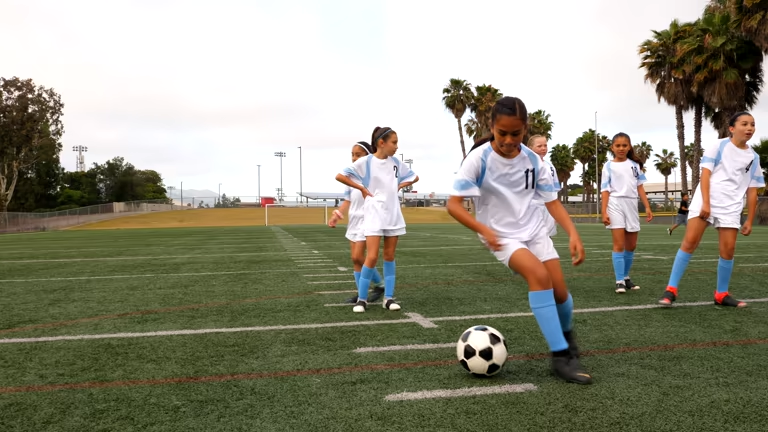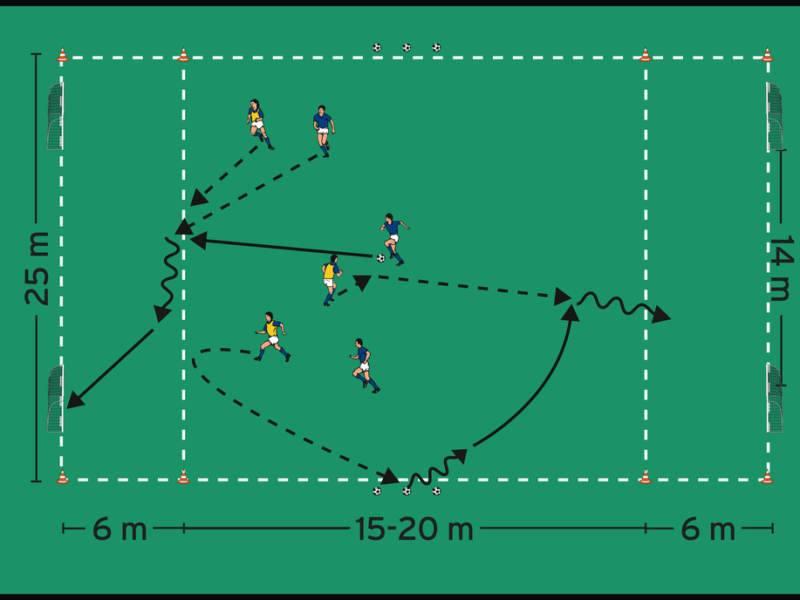Handling gossip and negativity from other soccer parents is something no one really warns you about when your child first joins a team. You sign them up to learn, to grow, to have fun and maybe you expect some competitive tension, a few heated moments, the usual highs and lows of sports.
What you don’t expect is the way some parents can turn a youth match into their own personal stage.
The way whispers travel faster than passes.
The way judgment slips out in casual tones: about who played well, who didn’t, whose kid “always gets picked,” and who’s clearly “not trying hard enough.”
It’s uncomfortable. Sometimes it’s subtle. Other times it’s loud and impossible to ignore. Either way, it chips away at the experience for you and your child.
And while you can’t press mute on every negative voice, you can choose how you move through it.
This is about doing just that, staying grounded, staying clear, and choosing presence over pressure, peace over pettiness. Because youth soccer should be a source of joy. And you deserve to protect that, for your child and for yourself.
Why Gossip Happens on the Sidelines

There’s no one reason. It builds slowly. A complaint here. A sigh there. A muttered, “Well, if my kid was out there, we’d be winning.”
Underneath it all, it often comes from a place of emotional overflow.
Some parents are carrying frustrations they don’t know how to release. Maybe their child isn’t getting enough playing time. Maybe they think the coach plays favorites. Maybe their child is struggling, and they’re not sure how to help.
Others are looking for connection, and they reach for the lowest-hanging fruit, complaint. It’s easier to bond over what’s wrong than to reflect on what’s right.
Then there’s the energy some folks carry into every space restless, competitive, ready to size others up. They pick apart everything: other players, coaching choices, even your child’s attitude on the field.
And unfortunately, in youth sports, these behaviors tend to be brushed off. “They’re just passionate,” people say. But passion should never come at the cost of kindness.
CHECK OUT | 10 Big Mistakes Every Soccer Parent Should Avoid
How Negativity Affects Your Child—Even When It’s Not About Them
Children soak up everything. Even when they’re focused on the ball, they hear the sidelines. They feel the atmosphere.
A snide comment might not seem like a big deal to you, but it stays with them.
They hear:
- “She shouldn’t be on the field.”
- “Why is he even playing midfield?”
- “That goal was lucky. He can’t defend to save his life.”
Even if it’s not about them, those words dig into their confidence. They begin to wonder, Am I being judged too?
Team spirit starts to crack. Gossip divides parents, and kids feel that. One day they’re laughing with a teammate, the next they’re distant. Why? Because their parents have been comparing and criticizing from behind the fence. That energy trickles down.
Worse, it teaches kids a dangerous lesson. If problems are dealt with through gossip, if every setback is blamed on someone else, then growth stalls. The post-game conversation becomes less about effort and more about who messed up.
And that’s not what youth soccer is supposed to be.
Your Role in All This
You may not be the one stirring the pot. But if you’re anywhere near the kitchen, the smell sticks to you.
You don’t have to become the “team therapist” or fix other people. What you can do is protect your peace, preserve your child’s joy, and become the quiet example of what healthy sideline behavior looks like.
You have more influence than you think not just on your child, but on the entire team environment. And it starts with small, grounded choices.
CHECK OUT | 10 Best Youth Soccer Clubs in New York for Aspiring Players
Strategy 1: The “Headphones” Approach — Block Out the Noise
Sometimes silence is your best friend.
You’re not required to participate in every sideline conversation. In fact, sometimes disengaging is the most powerful response you can give.
Try this:
- Pop in earbuds, even if you’re not listening to anything. It sends a clear but gentle signal: I’m here for the game, not the drama.
- Shift your physical spot. If you know the usual group is about to go in on a coach, a player, or a play, grab your chair and walk 20 feet to the left. Find the quiet parent. There’s always at least one.
- Keep your eyes on the field, not the faces beside you. Learn to watch the game with your whole heart, not your social awareness.
This isn’t about being rude. It’s about preserving your mental energy for what actually matters.
One mom i know listens to classical music during games. Another dad watches every match with sunglasses and a tiny notebook in hand, jotting down goals and good passes like a quiet scout. Find your version of focus and stick with it.
Strategy 2: Set Boundaries Without Making a Scene
You can be firm and warm at the same time.
You don’t have to laugh along when someone makes a cutting remark. You also don’t have to deliver a life lesson every time someone says something out of pocket.
There’s a middle ground, one that allows you to keep your values intact without inviting conflict.
Examples of what you can say:
- “Hmm, I hadn’t really noticed that. All the kids are still learning.”
- “I try to focus on what they’re doing well.”
- “Maybe it’s something to bring up with the coach directly.”
- “I’d rather not get into that.”
And if the criticism is directed at your child; take a deep breath, then try something calm but direct:
- “I’d appreciate it if we kept the conversation supportive.”
- “That’s my child. Let’s encourage them instead.”
These words may feel a little uncomfortable at first. But over time, they become easier to say. You’ll build a quiet reputation for being respectful but unshakeable.
You don’t have to change anyone else. You just need to show what you’re willing to stand near.
CHECK OUT | Soccer Club Fees: What Parents Need to Know Before Signing Up
Strategy 3: Focus on What You Can Control
This one’s the hardest but the most important.
Gossip and negativity need attention to thrive. When you shift your focus away from them, they start to shrink.
Here’s what you can control:
- Your voice. Use it to cheer. Loudly. For your child and for the team. Celebrate the effort, not just the outcomes.
- Your body language. Clapping. Smiling. High fives. When a kid on the other team scores a beauty of a goal, admire it. These small things shape the energy around you.
- Your post-game conversations. Focus on what your child did well. If they’re upset, help them see what they learned. Let them process, then move on.
- Your attitude toward the coach and officials. Even if you don’t agree with every decision, keep it respectful. Thank them after the game. Show your child what sportsmanship looks like outside the white lines.
And most importantly:
Model the kind of behavior you want your child to grow into.
They’re always watching. Not just how you react when they score, but how you respond when things don’t go their way. Or when someone says something unkind. Or when the game doesn’t feel fair.
Show them calm. Show them resilience. Show them that their parent is a safe place to land, no matter what.
What to Say to Your Child When They Notice the Negativity
Because eventually, they will.
Maybe they heard someone talking about them. Maybe a teammate said something hurtful that they clearly picked up from home. Maybe they just feel the tension.
Here’s how to help them through it:
- “Sometimes people say things when they’re frustrated. It doesn’t mean they’re right, and it doesn’t mean you have to believe it.”
- “You’re here to learn, not to be perfect.”
- “Let’s focus on what you can control; your effort, your attitude, your love for the game.”
- “People who feel the need to talk badly about others are often struggling with their own stuff. That’s not yours to carry.”
Reinforce that your love for them has nothing to do with goals or assists. That their worth isn’t up for debate on a sideline.
CHECK OUT | How to Be the Best Soccer Parent: Support, Motivate & Inspire Your Child
When It’s Really Too Much
If the gossip becomes bullying or starts affecting your child’s mental health, speak up. Quiet strength is powerful, but silence is not the same as passivity.
You can:
- Speak to the coach privately.
- Bring concerns to a team manager.
- Address repeat offenders with direct, respectful language.
- Encourage your club to implement a parent code of conduct (if they haven’t already).
You’re allowed to protect your peace. You’re allowed to expect a respectful environment. Youth sports should be healthy—for everyone.
The Long Game
Youth soccer isn’t just about soccer. It’s about growth. It’s about showing up. It’s about finding yourself in the wins and the losses, the cheers and the silences.
Your child will remember your support more than they’ll remember the scores.
They’ll remember how you clapped even when they missed the shot.
How you smiled even when the ref got it wrong.
How you handled ugly behavior with grace instead of fire.
That’s what sticks.
So let the gossip swirl somewhere else. Let the negativity burn itself out. You have a child to raise, a game to enjoy, and a sideline to reclaim.
One calm breath at a time.
CHECK OUT | 10 Best Soccer Colleges in the U.S. for Aspiring Student-Athletes



